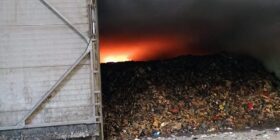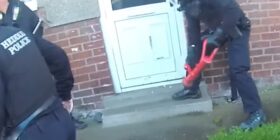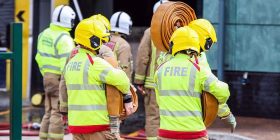“I would stress that this second surge is happening and at the moment, I would say that day by day, week by week, it’s getting worse”
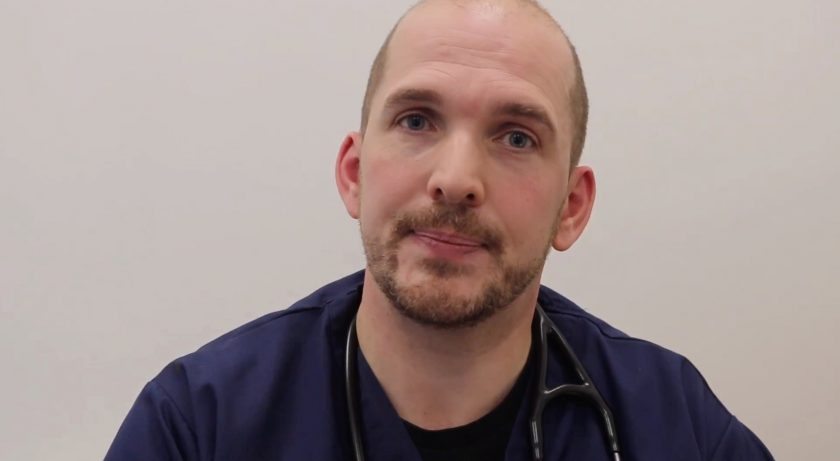
A Consultant at the Wrexham Maelor Hospital has spoke of his concern of the rising number of coronavirus cases locally and warned that the second surge is “getting worse”, while pointing out “it is not that complex actually, ultimately you can’t catch the virus if you don’t come into contact with someone with the virus. It’s very simple.”
Consultant Chest Physician Dr James Kilbane, who has worked throughout the pandemic treating patients with COVID-19 at the Maelor Hospital, last week was subject of a short video clip asking people to follow the firebreak rules.
We asked Dr Kilbane, who has worked as a Consultant at Wrexham Maelor Hospital since 2015 and in the last nine months on the designated COVID wards within the hospital, what the “upturn of the number of COVID admissions in Wrexham” meant in the video last week.
Dr Kilbane explained, “I think it goes without saying that we’re seeing more positive test results in the community, which then unfortunately down the line, then translates into increased hospital admissions. Now we are seeing increased positive results in all age groups. So it’s not just a particular subset of of the local population, but unfortunately the older population that is more likely to be admitted as a consequence of a positive test or have complications of a covid illness.”
“We are beginning to see those positive tests in the community being translated into an increasing number of positive patients requiring admission into the Maelor Hospital.”
“So if we consider that during the first surge from March in the summer months, we obviously ramped up in terms of our approach to covid care, we went from not having had to deal with covid before to then dealing with covid.
“That meant a complete change in the way that we worked, the structure of the hospital where we were caring for these patients required changing wards over specifically for covid care, changing wards to provide that higher level of respiratory care for the complications of covid and also looking in terms of surge capacity in intensive care.”
“So, we came through that first surge and in the summer months, particularly I think as a direct consequence of the full lockdown, we were able to suppress the virus to a point whereby we were then no longer seeing such rife community transmission, and therefore the admissions dropped off. We did actually get to a point whereby we had no covid admissions. So the measures that we took worked.
“However, and I think what is really important ad to stress to the to the public, is that the covid virus is the same virus. It has never gone away. It still is virulent, and it is still as deadly as it was before.”
“What then happens is, unfortunately and as human behaviour changes, then that transmission rate increases. At some point you reach a tipping point whereby that increase in transmission results in an increase in admissions. We are now seeing that, it is very evident at the front door.”
“My background is I am a chest consultant, so I’ve been obviously heavily involved from a covid perspective from the beginning. But, I also work at the front door on the admissions side of things. So I am seeing now, more or less daily covid admissions, not everybody needs to be an inpatient, a lot of people are coming to hospital for assessment, and we’re able to discharge them.”
“Again, an increasing proportion of those patients that then attend are then being admitted. So we’ve now started to ramp up our inpatient bed base for the care of covid patients. We are seeing not only covid patients within the ward environment, but also within more high care respiratory areas, and also in ICU.”
“So, I would stress that this second surge is happening, and at the moment, I would say that day by day, week by week, it’s getting worse.”
With the increase in cases and an uptick in the public stats for the local health board we asked what that meant in terms of the capacity in the local health system to deal with Covid-19 and what the concerns are, and can current demand be met.
Dr Kilbane said, “Yes, we are able to deal with what we’ve got so far. But I think that as a clinician I am concerned, and I think my colleagues are concerned, as to how we will continue to cope. We are coping, and I want people to have confidence that we are, but it is not an easy situation that we find ourselves in.
“It is quite a tight situation at the moment and it will really depend upon what comes down the line in terms of these patients that are contracting covid at the moment, but might not present the hospital for the next two to four weeks. Because even if you incubate the virus, that doesn’t mean you become really ill straight away, it can take time.
“So we are mindful, and we are respectful of this situation. We are all working really hard in terms of addressing the need and we are planning ahead.”
Yesterday saw 80 new cases attributed to the Wrexham area in the Public Health Wales daily statistical update, we asked Dr Kilbane if the recent rise in such figures concerns him over what he and his colleagues could have to face in the future.
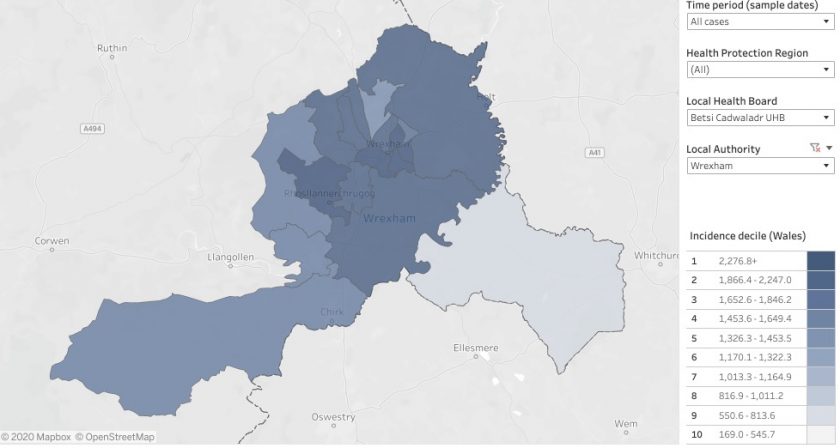
Public Health Wales now publish a clickable map updated daily with more localised case related data. You can view it on the tabs on the PHW ‘Tableau’ data visualisation here.
Dr Kilbane said: “I wouldn’t be human, and I certainly wouldn’t be a clinician, if I didn’t worry about that. I think we all do and we are we are all mindful of what this will mean for us moving into winter.
“So yes, of course I worry about that but you know, we are all here to do the job that we were trained to do and I work with a fantastic bunch of nurses, doctors and also non medical people that have really pulled together over the past seven months or so, and we will continue to do so.”
“We know if transmission rates in the community are increasing then admissions to hospital will increase in, and that’s going to impact on us all across the hospital, and that’s going to impact on patients as a whole as well. So, yes, it’s a worrying time.”
Dr Kilbane praised the public for their support earlier in the year, so we asked what he would ask of the public now heading into November.
He said: “I have to say that the first time around, and certainly the initial lockdown, I think that the population of Wrexham and the population of North Wales were really very respectful of those restrictions. That translated into a reduction eventually in terms of admissions and a control of the situation. So again, I would reiterate the importance of the restrictions that have been introduced.
“This virus cannot cause you illness, it can’t make you ill, if you don’t come into contact with someone with it.
“A lot of the advice that we’re giving is to obviously reduce your social contacts, socially distance, wash your hands and wear a mask. These are the only weapons we have against covid, we don’t have that have a vaccine.
“Unfortunately, the treatments that have been mentioned in the press are not cures, but treatments that we can use to manage the condition better. So all we have got is adhering to the restrictions.
“I will reiterate this virus is still as deadly as it was in the spring and we’re beginning now to see it rearing its head again, how dangerous this virus is, because we’re seeing those increased admissions. So again, people need to adhere to the restrictions”.
When Wrexham.com posts on social media, be it Twitter Facebook or Instagram, regarding Covid-19 it is almost a certainty there will be responses doubting elements of the pandemic, with more local people saying coronavirus does not exist or it is ‘just the flu’. We asked Dr Kilbane what he would say to people who believe that, and also those who repeat it and share it to their friends and family.
Dr Kilbane said, “I would debunk those myths immediately.
“I would suggest that the statistics speak for themselves. We know up to the end of August of this year, that we knew that the number of covid deaths far outweigh the number of flu deaths that we would see up to that point, and we’re now in October.
“So we now know that covid has killed far more people than the pneumonia or flu would kill on a on a similar annual basis. We are probably seeing three times as many deaths due to covid than we do to flu or pneumonia. This is all clearly evident on the Office of National Statistics. I’m not saying anything that isn’t already out there for people to look at.”
“On the mortality rate for covid, if you get covid, you get admitted to the hospital with covid and you require respiratory support or ITU then your mortality rate for covid is higher than it would be for flu or pneumonia. It is a far more virulent disease and it’s killing far more people than flu would be, and I would suggest anyone that says that it is just a flu like illness is wrong.”
“I see the effects. I’ve seen firsthand the impact that covid has had on my patients, and how it impacts directly on families in terms of being with their loved ones at such a difficult time. I have seen again, firsthand, how devastating an illness this is. It is not an illness that should be taken trivially.”
“It is still with us. It is still killing people, and unfortunately, will continue to kill people.”
“As a consequence of the increasing transmission rates that we’re seeing in the local community, it’s everybody’s responsibility actually to heed the warnings.
“You might be young, you might be healthy, you might be in the prime of your life and you might think that actually, I’m not bothered by covid. Hopefully you won’t be, but that doesn’t mean you can’t be an asymptomatic carrier, or that you can’t have a mild illness.
“But those people that you come into contact with, which may be your loved ones, such as your parents or grandparents are then in those high risk groups, which may then actually be the more vulnerable people that will be admitted and potentially may then die as a direct consequence of the complications of this of this virus.
“So it is everybody’s responsibility across all age groups to to do that, and I suppose moral and social duty, to adhere to the restrictions to prevent vulnerable people getting this.”
“I clearly am aware of some of the information that is out there and I would suggest to anybody who thinks otherwise, feel free to phone me, give me a call, and I will put you straight because we know that this virus is not trivial. It is not something to be underestimated at all.”
We asked Dr Kilbane if he had a further message to the local community, he said:”I feel strongly about the increasing numbers in the community and how that’s impacting on the hospital, and obviously, how that’s going to impact as we move through winter. So again, just reiterating adherence to the restrictions and things that have been introduced.”
“Hopefully, we can debunk some of those myths that are floating around. We have been working in this covid environment now for the past seven, eight months now. So you do see the impact and the chaos that this virus causes and I don’t want any family to go through that. That’s why it’s everybody’s responsibility.
“We’re all here to care for our patients, we all want the best for our patients. We don’t want them to get an illness effectively, that could be avoided by adhering to the restrictions and the guidelines that are out there.”
“People have been really patient, people have worked really hard, and I understand that the general population might be getting a bit fatigued now in terms of the restrictions, but that’s the only weapon that we have at the moment against this virus.”
“It is about not weakening now, it’s about being strong, and to keep going with that social distancing, the hand washing, the face masks, etc. Hopefully from the New Year and hopefully with these vaccine trials then we may be able to come out of this the other end fairly unscathed, but obviously, it requires everybody’s help.
“It is not that complex actually, ultimately you can’t catch the virus if you don’t come into contact with someone with the virus. It’s very simple.
“So it’s about breaking those chains of transmission, and that’s for the people in the community in Wrexham, and North Wales to do, it is within their gift. It is within their power.”
Spotted something? Got a story? Email [email protected]
